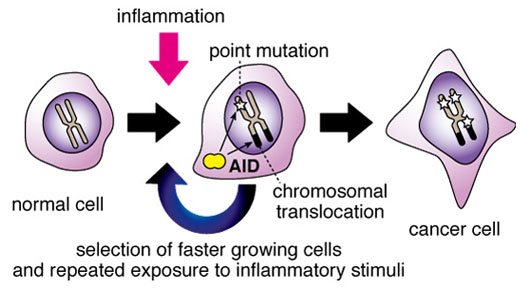AID发癌
Genetic mutations that disrupt cellular mechanism for growth control give rise to cancer cells. The exact mechanism how those mutations are induced is not known, which is true for many cancers that account for majority of death, including cancers of stomach, colon, liver and lung. For example, we know that Helicobacter pylori, hepatitis viruses, and asbest are the causes of stomach, liver, and lung cancers, respectively. However, we do not know how these agents induce DNA mutations. On the other hand, chronic inflammation is frequently discussed as a predisposing factor for cancer. Something induced by inflammation is thought to cause gene mutations.
Activation-induced cytidine deaminase (AID) is an enzyme for diversification of antibodies. It introduces massive mutations in antibody genes, the frequency of which is surprizingly high, as million (1,000,000)-times high as spontaneous mutations in the other genes. AID is produced in activated B lymphocytes that specialize for antibody production. AID has off-target activity that mutates genes other than those for antibodies. This off-target action is thought to cause lymphoma and leukemia. Our laboratory found that AID can be produced in epithelial cells of stomach, lung, and liver in response to inflammatory stimuli. Therefore, we speculate that AID is involved not only in lymphoma but also in those epithelial cancers.
Our data indicated:
- AID transgenic mice frequently developed liver tumors. These liver tumors frequently harbor mutation in p53 gene (Trp53 in mouse, corresponding to TP53 in human).[publication 44]
- In the lung of AID transgenic mice, cell death occurred more frequently than normal mice, with continuous alveolar regeneration. Very minority of these regenerative cells, due to the action of mutagenic AID, progresses into tumor.[publication 53]If we extrapolate this phenomenon to human, we may be able to understand why cancer develops from chronic inflammation. After some tissue insult causes inflammation, cells are destroyed and process of regeneration begins. Regenerative tissue in the inflammatory environment expresses AID, which makes oncogenic mutation. If, by chance, mutated cells could escape from immune surveillance, lucky subpopulation of cells that acquire enhanced growth potential may start to divide into large mass. To become malignant tumor, cells must acquire further properties for metastasis.
- In experiments employing two-stage chemical carcinogenesis for the mouse skin, AID deficiency decreased tumor frequency. One of the chemicals (TPA) induced AID expression in keratinocytes. These results indicate that AID is involved in skin tumor formation. [publication 55]
Currently, we are doing experiments to prove AID involvment in human cancer.(review article is here)




